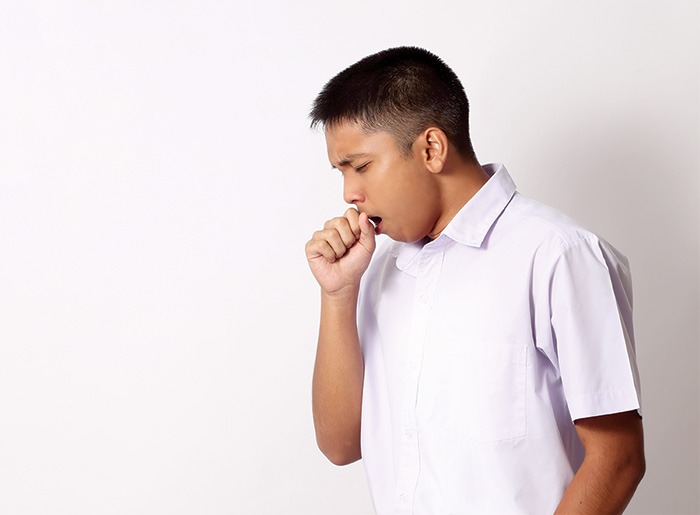Allergic rhinitis (AR) affects around 1 in 5 Australians, but often goes unrecognised and undertreated.
Thanks to climate change, an increasing number of adults report that their allergy symptoms have worsened and are affecting them for a longer period throughout the year. Yet only 15% of adults self-select appropriate allergy medications.

This can lead to inadequate treatment and, over time, AR will start to impact their daily life.
In part 2 of this podcast series, Brett McFarlane, Health Services Manager for Priceline Pharmacy Group, and community pharmacist Esmond Biesiek-Wright, explore the impact of undertreated AR in adults, effective treatment options and how to recognise and manage AR effectively.
Transcript
Dr Brett MacFarlane
Oh, hello everyone, and welcome to this podcast on allergic rhinitis or hay fever, as it’s commonly called. My name is Brett McFarlane. I’m the health services manager for the Priceline Pharmacy Network. And hay fever or allergic rhinitis is something that I have been talking about for a long time now, particularly around the role of the pharmacist. I’m very happy today to be joined by pharmacist Esmond Biesiek-Wright. Welcome Esmond, perhaps you could tell us a little bit about what your interest is in hay fever.
Esmond Biesiek-Wright
Oh thanks Brett, and thanks for having me back again. I’m a community pharmacist based in Canberra. Canberra, as we know, is the allergy capital of Australia. And my interest really piques from the fact that we deal with this on a day-to-day basis.
Dr Brett MacFarlane
Wow. Okay. So obviously Esmond you’re right in the thick of it there, being in Canberra, would you like to just tell us generally about allergic rhinitis in adults.
Esmond Biesiek-Wright
Of course.Community pharmacists obviously play an integral role in dealing with allergic rhinitis patients on a day to day.1 There was a study done a few years ago where Canberra or the ACT was actually shown to have about 29% of patients having allergic rhinitis in that 2017, 2018 period.2 That’s a huge number given our population. I think in regards to the prevalence though, there is quite a lot of people that are probably underdiagnosed because they’re just not seeking the right advice.4
Esmond Biesiek-Wright
Of course, there’s a few triggers for this, and they could be seasonal or, you know, all year round. But probably the most common ones are the environmental ones. So pollens, dust mites, moulds and animal dander.3,4 We know that if you don’t treat your reactions properly, over time, it will start to impact your daily life.4
Dr Brett MacFarlane
Yeah, I agree. I think that as pharmacists, we’ve got a very important role to play to help patients to understand the diagnosis, particularly if they think that they’re experiencing a head cold or something like that, as opposed to allergic rhinitis, and then to provide the non-therapeutic and therapeutic advice around how to manage their condition.
Something that I think is really interesting is the potential impact of climate change on allergic rhinitis, and how maybe the hay fever seasons can be changing as a result of that.
Dr Brett MacFarlane
Quite often there being an allergy season around springtime, that key season is broadening now, particularly in warmer temperatures or those areas that have variable effects of rainfall influencing pollen seasons, and therefore the prevalence and the duration of time that a person has allergic rhinitis.
Dr Brett MacFarlane
So in Australia and New Zealand, we have significant geographical variability in pollen count and season duration. So therefore the pollen seasons will change again depending on where you are. For instance, in Brisbane they have longer seasons with many high pollen days, whereas in Melbourne the season is shorter, but it’s actually a lot more intense.
Esmond Biesiek-Wright
Of course, when we consider that time frame between, you know, spring, summer and early autumn, you can kind of look at those allergic rhinitis sufferers and kind of pick from the period of time that they start getting the symptoms as to what might be triggering it. So if we’re looking early to late spring, it’s probably going to be tree pollens.
Esmond Biesiek-Wright
If we’re looking at late spring, it’s probably going to be grass pollen. And if we’re going into that summer period, it’s probably going to be about ragweed. During that time frame, there’s a couple of things that patients can do to try and avoid those allergens directly. If they know that the pollen count is going to be high on a particular day, they should remain indoors.
If there’s going to be any thunderstorms or on windy days, they should try and avoid being outside at those times as well.4 You know, 3 in 10 allergy sufferers reported worsening symptoms in the last five years. Those allergy sufferers, there was about 60% of them saying that they were getting symptoms outside of that standard season.9
Dr Brett MacFarlane
Okay. That’s interesting. Have you personally in Canberra seen potential impacts of climate change on allergic rhinitis?
Esmond Biesiek-Wright
For sure! Where I am in Canberra, there’s definitely been an increase in the number and severity of cases. There’s definitely an increase in the warming and extension of that allergy period as we were talking about before. But probably the biggest thing that you hear from patients on a daily basis is that they feel like their allergies are getting worse, whereas previously an antihistamine may have kept the symptoms under control.
Esmond Biesiek-Wright
Now they’ve had to add in other options or other treatment agents to be able to get to the same level, to be able to get the same relief.
Dr Brett MacFarlane
What type of symptoms are you commonly seeing in your adult patients with allergic rhinitis?
Esmond Biesiek-Wright
Symptoms really would be, you know, the basics. So, itchy, sneezing, maybe some runny nose, nasal congestion. And then there’s a couple of things that can stem from that. So itchy or watery eyes, or itchy nose or palate. A common thing if someone’s in that period of time, is you might hear them trying to clear their throat. And it’s probably most likely to be post-nasal drip.1,3,4 Of course, you know, what we see with the patient may change depending on what type of allergic rhinitis they have as well, and what time of the year it is. So that will depend on the season. So seasonal allergic rhinitis symptoms probably get worse around that spring and summer period of time. And that’s purely based on those pollen counts. As we know from earlier, pollen can come from grasses, weeds and trees. There’s those people that have that allergy all year round, those perennial sufferers, but they might get some seasonal exacerbation. So it might be worse, you know, in the spring, in the summer. But you know, they’ve still got the symptoms lingering.If it’s intermittent, normally it’s for under a period of about four days per week. But it still needs to occur for under four weeks. If it’s persistent or the perennial kind of thing, it’s greater than four days per week, and it lasts for longer than four weeks at a time. Those symptoms can be, you know, one extreme to the other.
So it could be mild, could be moderate. Most of the mild ones wouldn’t affect your daily functioning, but the severe ones, you might not be able to think straight. It might affect your work performance.3,4
Dr Brett MacFarlane
So, given that there is a broad range of symptoms that a person can experience with hay fever, in order to get the right strategy together for the patient, we absolutely have to understand the difference between other conditions and allergic rhinitis, and how to appropriately treat the patient in the short- and the long-term. One of the unique challenges in managing hay fever in adults is differentiating those symptoms from other things, like viral respiratory conditions such as head cold or the flu. A cold symptom will typically last for 5 to 10 days. Obviously in contrast, hay fever symptoms can be triggered by allergens at any time of the year. But Esmond, what are the possible effects of patients self-selecting medicines for hay fever management?
Esmond Biesiek-Wright
Let’s look at the daily life of the pharmacist. If a patient comes in to pick something off the allergy wall, and they really don’t have a background or knowledge about what they’re selecting, they’re probably not going to select the treatment that’s going to give them the best outcome. It’s going to lead to suboptimal treatment and a poor clinical outcome.
Esmond Biesiek-Wright
Of course, we know from research that 70% of adults do self-select their own medications, but only 15% of those, choose the appropriate treatment. We also know that they sometimes underestimate the severity of their condition, which can affect how they pick their medications. And a lot of people do tolerate their symptoms until they start to significantly affect their life.1
Esmond Biesiek-Wright
But then that’s the point where they start to ask for professional advice. We know from research that allergy sufferers in the adult population undertreat their allergies close to or during the allergy season.9
Dr Brett MacFarlane
Given the high rate of self-selection of management by patients, and that, as you say, Esmond they’re more than likely undertreating their hay fever –we know that in people with hay fever that is not well managed or treated optimally, that symptoms can become more severe so we can start experiencing impacts of sleep and concentration.4 What are some examples in your practice of a patient who was self-selecting a medication for their hay fever, and what is the subsequent issue in your opinion, related to the effectiveness of that?
Esmond Biesiek-Wright
Yeah, Brett, self-selection obviously occurs all the time. There’s probably a number of things that affect why someone’s doing the self-selection that they’re doing. Probably the first one is ‘I’ve used it previously. It gave me some relief, so why wouldn’t I use that again?’ Some people just might be really overwhelmed. There’s a lot of products in there. There’s a lot of brands.
Esmond Biesiek-Wright
You know, even though we know that there’s probably only a few ingredients in each of them, there’s quite a lot there for someone to take in, and they probably just pick one because they can’t make a selection out of the entirety. Self-selection, obviously without advice, is an important issue for us as practitioners to tackle. And that’s purely because if they’re self-selecting and they’re not treating optimally, they’re under-treating their own symptoms.
Dr Brett MacFarlane
So Esmond what are some effective strategies pharmacists have to ensure that adults receive the proper diagnosis and treatment for their hay fever?
Esmond Biesiek-Wright
As we know, allergy sufferers would like to seek more effective medications.1 Pharmacists can probably make the most of that opportunity to engage with these people by updating themselves on what’s the appropriate management and the appropriate medicines. Of course, when you’re in a conversation with a patient, it’s really important to ask about their condition. And if they’re a regular customer, you should be following up.
Esmond Biesiek-Wright
It’s not all about the pharmacist. We have a range of people who work instore, and of course, it’s really important for your staff to prompt patients to speak up if they’ve got any questions in regards to their treatments. There are a couple of tools that people can use now, which, you know, you can put on the shelf at the allergy section.
Esmond Biesiek-Wright
It’s called the ARIA Visual Analog Scale. That can help patients as well self evaluate their own allergy status and then speak to the pharmacist if they wish.1
Dr Brett MacFarlane
So when you are speaking to a patient who potentially has allergic rhinitis, what type of history would you take to help you identify their symptoms and determine appropriate treatment?
Esmond Biesiek-Wright
So probably the first thing is their environment. What’s their risk of allergen exposure? What kind of symptoms do they actually have? Is there a particular time that they’re getting those symptoms? And is there any flow on effects from those? So is it starting to affect their quality of life? I think the key is to really ask some detailed questions here.11
So what symptoms do you actually have and how are they impacting your daily life? And of course, you’re probably not the only health professional that someone’s got advice from. So have they ever been diagnosed by the GP, for example, with hay fever or asthma?
Dr Brett MacFarlane
Yeah, I agree those history points are really important. But the other thing that pharmacists should do is to educate themselves about the types of allergy testing that a general practitioner or an allergist can do for people with allergic rhinitis, particularly if it’s poorly controlled, and explain to them what the outcomes of that testing mean, because it can help them to understand how to avoid their allergens.
And then the importance of long-term management for their condition.
Esmond Biesiek-Wright
Yeah. So those patients with long-term symptoms really stressing that importance of recognising the symptoms and making sure that we’re setting treatment goals. We all recommend that we should avoid those allergen triggers, of course. But there’s a couple of key things here – which is making sure that they’re checking the pollen forecast for the day and making sure that they’re using an intranasal medication correctly.
We also really should be focusing on encouraging patients to keep a symptoms diary and setting reminders for them to take their medication and know when they should be returning for a reassessment.
Dr Brett MacFarlane
Esmond, obviously, we do have many options available to us as pharmacists with over-the-counter medicines for the management of hay fever in adults – what are some of your recommendations?
It’s not all about the pharmacist. We have a range of people who work instore, and of course, it’s really important for your staff to prompt patients to speak up if they’ve got any questions in regards to their treatments. There are a couple of tools that people can use now, which, you know, you can put on the shelf at the allergy section.
Esmond Biesiek-Wright
It’s called the ARIA Visual Analog Scale. That can help patients as well self evaluate their own allergy status and then speak to the pharmacist if they wish.1
Dr Brett MacFarlane
So when you are speaking to a patient who potentially has allergic rhinitis, what type of history would you take to help you identify their symptoms and determine appropriate treatment?
Esmond Biesiek-Wright
So probably the first thing is their environment. What’s their risk of allergen exposure? What kind of symptoms do they actually have? Is there a particular time that they’re getting those symptoms? And is there any flow on effects from those? So is it starting to affect their quality of life? I think the key is to really ask some detailed questions here.11
So what symptoms do you actually have and how are they impacting your daily life? And of course, you’re probably not the only health professional that someone’s got advice from. So have they ever been diagnosed by the GP, for example, with hay fever or asthma?
Dr Brett MacFarlane
Yeah, I agree those history points are really important. But the other thing that pharmacists should do is to educate themselves about the types of allergy testing that a general practitioner or an allergist can do for people with allergic rhinitis, particularly if it’s poorly controlled, and explain to them what the outcomes of that testing mean, because it can help them to understand how to avoid their allergens.
And then the importance of long-term management for their condition.
Esmond Biesiek-Wright
Yeah. So those patients with long-term symptoms really stressing that importance of recognising the symptoms and making sure that we’re setting treatment goals. We all recommend that we should avoid those allergen triggers, of course. But there’s a couple of key things here – which is making sure that they’re checking the pollen forecast for the day and making sure that they’re using an intranasal medication correctly.
We also really should be focusing on encouraging patients to keep a symptoms diary and setting reminders for them to take their medication and know when they should be returning for a reassessment.
Dr Brett MacFarlane
Esmond, obviously, we do have many options available to us as pharmacists with over-the-counter medicines for the management of hay fever in adults – what are some of your recommendations?
Esmond Biesiek-Wright
Of course, oral and topical antihistamines are really effective in treating those allergy symptoms.11 So the itching, the runny nose, the sneezing, but they’re not that great for nasal blockage of course. The newer versions, so those second generation antihistamines like cetirizine, loratadine and fexofenadine are generally preferred because they’ve got fewer side effects comparative to the first generation ones.11
There’s options for everything. So tablets, syrups and sprays over the counter. But some other treatments that people may look at would be the intranasal corticosteroids. And you can use those alongside, you know, antihistamines, decongestant sprays as well.
Dr Brett MacFarlane
So I think we should underline here that it’s the non-sedating antihistamines that are the preferred treatment, as opposed to the more sedating antihistamines for allergic rhinitis.3 You know these are available over the counter in the form of oral and intranasal sprays. The benefits include that rapid relief. And you only need to take them once or twice a day.
Dr Brett MacFarlane
They’ll cover symptoms like itchiness of the nose, watery eyes, the sneezing and runny nose. Perhaps you’d like to talk to us a little bit more specifically about cetirizine.
Esmond Biesiek-Wright
So cetirizine is conveniently available in various formats – tablets, liquid and oral drops – and provides fast acting relief from multiple allergy symptoms at any time of the day.
Dr Brett MacFarlane
So to help the listeners practically Esmond, what are your tips for helping to identify hay fever sufferers in the pharmacy?
Esmond Biesiek-Wright
Well, look, identifying patients with allergic rhinitis should be easy, right? They’re going to head to the cold and flu or the allergy section, and they’re going to try and find something to treat the symptoms that they’ve got right now. I think the thing is, once you’ve identified a patient, the next step is to really give them that educational experience, to be able to make better informed decisions for their own allergic rhinitis treatment.
Esmond Biesiek-Wright
I think that reassessment on a regular basis is important because, as we know, allergic rhinitis doesn’t necessarily maintain that same intensity every day. At some points an antihistamine might work to cover their symptoms, but on other occasions, they may need to add in an Intranasal corticosteroids and a saline rinse to keep those allergens down. The key point with this is to make sure that the education that you provide makes it easier for the patient to ask questions to make sure that they get their optimal treatment.
Dr Brett MacFarlane
So just to recap, today we’ve explored the significant impact of hay fever on adults, addressing the challenges of proper diagnosis, the risks of selection of medications, and the crucial role of professional guidance in managing this chronic condition. Hay fever is not a minor ailment. It imposes a substantial socioeconomic burden on patients, their families and on society. In Australia, allergic rhinitis socioeconomic costs is up to $9.4 billion due to absenteeism, reduced productivity and treatment expenses.1
Esmond Biesiek-Wright
Patients seeking treatment for the relief of symptoms such as insomnia, lack of concentration or fatigue, recurrent sinus infections, headache should be all evaluated for allergic rhinitis.3 A 2024 Australian Community Pharmacy Survey found that short acting beta-agonist over-users are more likely to have moderate to severe rhinitis symptoms. Pharmacists have a key role here in investigating as to why patients without an asthma diagnosis are actually using SABAs and identifying those other co-morbidities, such as allergic rhinitis, that could be worsening those asthma-like symptoms.15
Dr Brett MacFarlane
So, Esmond I think we’ve highlighted the pivotal role of pharmacists in ensuring optimal care for hay fever sufferers, and the strategies that we’ve outlined include taking detailed history, recognising the physical signs and educating patients on allergy avoidance and their treatment options. Many patients self-select medications, leading to suboptimal treatment outcomes. To counteract under-treatment, pharmacists should stress the importance of effective ongoing treatment throughout the extended allergy season.
Esmond Biesiek-Wright
Yes Brett, for treatment, we’ve also emphasised the efficacy of those second generation antihistamines. We encourage you to all visit the Zyrtec website for extensive resources to manage allergy symptoms effectively. You may also request a free Zyrtec allergy kit for helpful tools and resources for your store.
Dr Brett MacFarlane
Thank you to everyone for joining us on the podcast today. I hope that you found this discussion insightful and helpful. A very special thank you to my guest Esmond.
Esmond Biesiek-Wright
Yeah, thanks for having me Brett.
Dr Brett MacFarlane
And thank you to our sponsor Kenvue.
For more information on allergic rhinitis, listen to the first podcast instalment: Allergic rhinitis in children.
References
- Tan R, Cvetkovski B, Kritikos V, Yan K, Price D, Smith P, Bosnic-Anticevich S. Management of allergic rhinitis in the community pharmacy: identifying the reasons behind medication self-selection. Pharmacy Practice 2018 Jul-Sep;16(3):1332.
- Australian Institute of Health and Welfare (AIHW). Allergic Rhinitis (hay fever) web report. 2023. https://www.aihw.gov.au/reports/chronic-respiratory-conditions/allergic-rhinitis-hay-fever/contents/allergic-rhinitis. Date accessed June 2024.
- Australasian Society of Clinical Immunology and Allergy (ASCIA). Allergic Rhinitis (Hay Fever) Frequently Asked Questions. 2024. https://www.allergy.org.au/patients/allergic-rhinitis-hay-fever-and-sinusitis. Date accessed June 2024.
- Australasian Society of Clinical Immunology and Allergy (ASCIA. Allergic Rhinits Clinical Update 2022. https://www.allergy.org.au/hp/papers/allergic-rhinitis-clinical-update. Date accessed June 2024.
- Lourenco O, Cvetkovski B, Kritikos V, et al. Management of allergic rhinitis symptoms in the pharmacy Pocket guide 2022. Clin Transl Allergy. 2022;e12183.
- Bosnic-Anticevich S, Smith P, Abramson M, et al. Impact of allergic rhinitis on the day-to- day lives of children: insights from an Australian cross-sectional study. BMJ Open 2020;10:e038870.
- Beggs PJ. Climate change and allergy in Australia: an innovative, high-income country, at potential risk. Public Health Res Pract. 2018;28(4):e2841828.
- Medek DE, et al. Regional and seasonal variation in airborne grass pollen levels between cities of Australia and New Zealand. Aerobiologia (Bologna). 2016 Jun;32(2):289-302.
- Data on file.Fiftyfive5. Allergy U&A 2022: J&J Market Research. January 2023.
- Z Chad. Allergies in children. Paediatr Child Health 2001;6(8):555-566.
- Hu W, et al. Impact of Allergies on Quality of Life and Economic Burden. Aust Fam Physician. 2008 Apr;37(4):214-220.
- Supplementary Material: Lourenco O, Cvetkovski B, Kritikos V, et al. Management of allergic rhinitis symptoms in the pharmacy Pocket guide 2022. Clin Transl Allergy. 2022;e12183. https://onlinelibrary.wiley.com/action/downloadSupplement?doi=10.1002%2Fclt2.12183&file=clt212183-sup-0001-suppl-data.docx. Date accessed June 2024.
- Day JH, Briscoe M, Widlitz MD. Cetirizine, loratadine, or placebo in subjects with seasonal allergic rhinitis: Effects after controlled ragweed pollen challenge in an environmental exposure unit. J Allergy Clin Immunol. 1998 May;101(5):638-45.
- Zyrtec® Cetirizine approved product information. Australia. May 2019.
- Azzi EA, Kritikos V, Peters MJ, et al. Understanding reliever overuse in patients purchasing over-the-counter short-acting beta2 agonists: an Australian community pharmacy based survey. BMJ Open 2019;9:e028995.



 Pharmacists have always prescribed, but they have the potential to prescribe much more
Pharmacists have always prescribed, but they have the potential to prescribe much more



 Sponsorship information
Sponsorship information


 Talking to patients who have questions
Talking to patients who have questions







